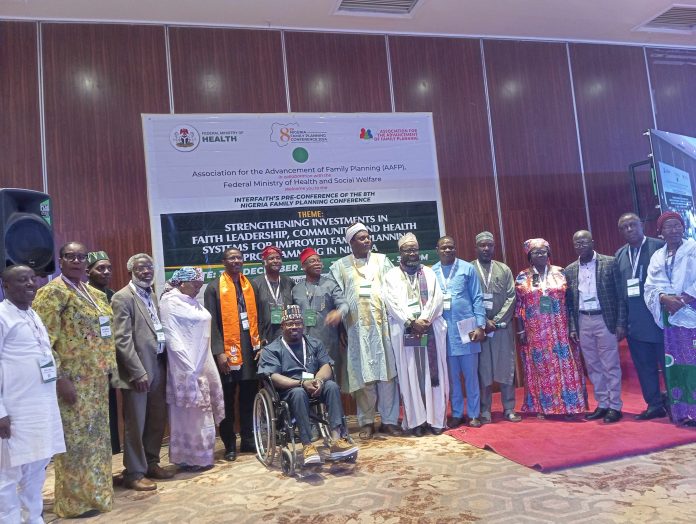Faith leaders play a pivotal role in promoting family planning and addressing Nigeria’s demographic challenges, as emphasized by experts at the 8th Nigeria Family Planning Conference – Youth and Interfaith Pre-Conference.
Integrating Family Planning into Cultural Practices
Prof. Oladapo Ladipo, Co-founder of the Association for Reproductive and Family Health (ARFH), advocated for faith leaders to incorporate family planning messages into community life events such as weddings, naming ceremonies, and even burials.
“Family planning should be preached at these gatherings to normalize its acceptance and adoption,” Ladipo stressed, highlighting their influence in breaking cultural barriers.
Role of Faith Leaders in Male Involvement
Rev. Isaac Gbadero of Interfaith ZIFSAM in Zaria emphasized the importance of engaging men in family planning conversations, calling on faith leaders to champion this cause.
“Faith leaders are trusted moral guides whose advocacy can overcome societal barriers hindering women’s access to family planning services,” he said.
Community-Centric Advocacy
Dr. Ejike Oji, Chairman of the Association for the Advancement of Family Planning (AAFP), noted the unique credibility faith leaders hold within communities.
“Their influence often surpasses that of politicians, making them instrumental in fostering societal acceptance of family planning,” Oji remarked.
Progress and Challenges
Barr. Nma Ogbonna, Head of Health Promotion at the Federal Ministry of Health (FMOH), celebrated Nigeria’s progress in family planning through enhanced policies, legal frameworks, and partnerships.
However, Dr. Dele Abegunde, Country Director of Population Council Nigeria, pointed out persistent barriers such as cultural norms, misinformation, and fear of side effects. He urged faith leaders to dispel myths, particularly misconceptions about infertility linked to contraceptive use.
Youth-Specific Family Planning Strategies
Jason Bremner, Senior Director for Family Planning 2030, highlighted the unique needs of Nigerian youth. Married youth often prefer implants and injectables, while unmarried sexually active youth rely on less effective methods like withdrawal and condoms.
“Meeting youth where they are with tailored education and counseling is essential to guide them toward effective contraceptive choices,” Bremner advised.
Call for Collaboration
The conference underscored the need for collaboration among faith leaders, policymakers, and healthcare providers.
Integrating family planning advocacy into the cultural and social fabric of Nigerian communities, experts argued, could transform attitudes, reduce barriers, and improve reproductive health outcomes nationwide.
By leveraging the trusted voices of faith leaders, Nigeria stands poised to address its demographic challenges and enhance family planning practices across all societal levels.
Speaking at the 8th Nigeria Family Planning Conference – Youth and Interfaith Pre-Conference, he emphasized that, “Family planning should be preached at weddings, naming ceremonies, and even burials.”
Highlighting the potential of faith leaders, Ladipo noted their influence in fostering societal change and breaking barriers to family planning practices.
Also, Rev. Isaac Gbadero of Interfaith ZIFSAM, Zaria, reinforced the call, focusing on the critical role of faith leaders in encouraging male involvement in family planning.
“Faith leaders are trusted voices who guide morals and spirituality; their advocacy opens doors previously closed to discussions on family planning,” Gbadero said, adding that men’s engagement is vital to overcoming societal barriers for women accessing services.
Dr. Ejike Oji, Chairman of the Management Committee for the Association for the Advancement of Family Planning (AAFP), highlighted the profound influence of faith leaders, often surpassing that of politicians.
“Faith leaders’ advocacy resonates with communities more deeply than political efforts, making them essential in addressing Nigeria’s demographic challenges,” he stated.
Barr. Nma Ogbonna, Head of the Health Promotion Division at the Federal Ministry of Health (FMOH), lauded the progress Nigeria has made in family planning, noting significant changes in perceptions over time.
“Through protective healthcare and health promotion, a lot has changed. Legal frameworks, policies, and partnerships are driving this transformation,” Ogbonna said.
Dr. Dele Abegunde, Country Director of Population Council Nigeria, outlined key barriers to male involvement in family planning, including cultural norms, fear of side effects, and misinformation.
He emphasized the role of faith leaders in dispelling misconceptions, such as fears of infertility caused by contraceptives, and promoting accurate, community-specific messaging.
In a related development, Jason Bremner, Data and Measurement Senior Director for Family Planning 2030, addressed the unique contraceptive preferences of Nigerian youth.
He noted that among married youth, implants and injectables are the most popular methods, while unmarried sexually active youth rely on less effective options such as withdrawal and condoms.
“Meeting youth where they are, providing the right information, education, and counseling, is essential to guide them toward effective contraceptive options,” Bremner said, calling for strategies that consider the specific needs of adolescents.
The conference underscored the importance of faith leaders, policymakers, and health professionals working together to promote family planning.
As stakeholders emphasized, integrating these efforts into the cultural and social fabric of communities can transform attitudes, reduce barriers, and improve reproductive health outcomes nationwide.

